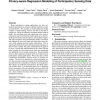Free Online Productivity Tools
i2Speak
i2Symbol
i2OCR
iTex2Img
iWeb2Print
iWeb2Shot
i2Type
iPdf2Split
iPdf2Merge
i2Bopomofo
i2Arabic
i2Style
i2Image
i2PDF
iLatex2Rtf
Sci2ools
SENSYS
2010
ACM
2010
ACM
Privacy-aware regression modeling of participatory sensing data
Many participatory sensing applications use data collected by participants to construct a public model of a system or phenomenon. For example, a health application might compute a model relating exercise and diet to amount of weight loss. While the ultimately computed model could be public, the individual input and output data traces used to construct it may be private data of participants (e.g., their individual food intake, lifestyle choices, and resulting weight). This paper proposes and experimentally studies a technique that attempts to keep such input and output data traces private, while allowing accurate model construction. This is significantly different from perturbation-based techniques in that no noise is added. The main contribution of the paper is to show a certain data transformation at the client side that helps keeping the client data private while not introducing any additional error to model construction. We particularly focus on linear regression models which are w...
| Added | 15 Feb 2011 |
| Updated | 15 Feb 2011 |
| Type | Journal |
| Year | 2010 |
| Where | SENSYS |
| Authors | Hossein Ahmadi, Nam Pham, Raghu K. Ganti, Tarek F. Abdelzaher, Suman Nath, Jiawei Han |
Comments (0)

